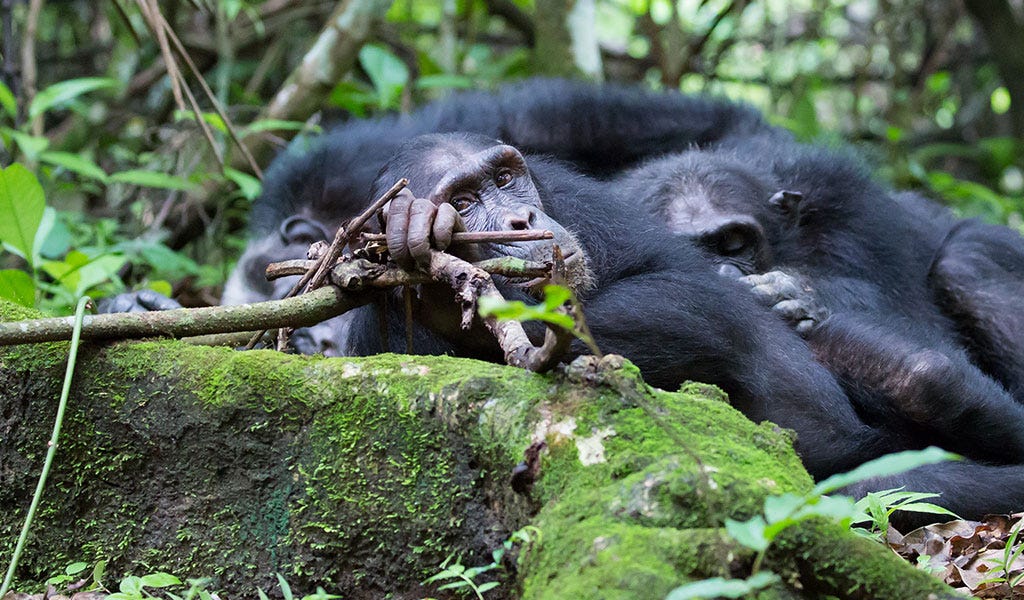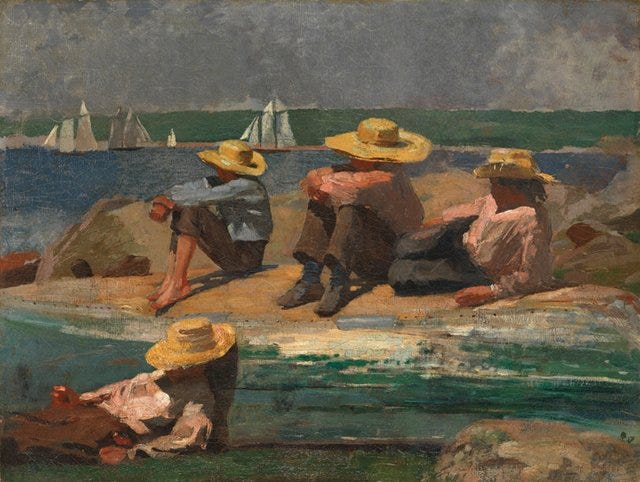Collective rest
I just can't do it without you...?
I first became consciously interested in collective rest during a three day outdoor residential led by dance artists Thomas Goodwin and Katye Coe, which provided an opportunity for participants to ‘explore connection to land and other living beings through embodiment exercises’. Tom has spent time observing the daily rhythms and rituals of groups of chimpanzees, some of which he gently invited us to partake in. We formed a roaming group, exploring a range of different wild Cornish habitats - mostly coastal. After eating lunch, Tom invited us to move to a nearby (but different) spot, to rest together. This, apparently, is how the chimps do it. The seven of us found ourselves snuggling into grassy hillocks, sand and/or rock, wind ruffling our jackets, warmed by summer sun, our limbs sometimes touching. There we drifted, for half an hour or so, somewhere between sleep and waking. Reflecting on this experience, I was struck by how familiar it felt. I scanned my life and confidently concluded I had never collectively rested in such a way before, and yet, as far as my body was concerned - it felt as if I had, a very long time ago. There was a deep sense of relief accompanying this state of being - an embodied certainty that it was needed on some basic level, that I had been missing it without knowing, that I was hard-wired for this. After repeating this collective rest, along with a wide range of other embodiment exercises (such as interacting with a landscape with senses other than sight), I experienced a radical shift in my relationship to time.
In the couple of years following my participation in Tom and Katye’s ‘Kinship Workshop’, literature that speaks to collective rest has serendipitously found its way to me, organically expanding my reference point and interest in kaleidoscopic fashion. Undrowned: Black Feminist Lessons from Marine Mammals by Alexis Pauline Gumbs was gifted to me by two friends during Jupiter Rising Music Festival (courtesy of the Lighthouse Bookshop stall). Gumbs’ meditations on rest, ancestry, time and resistance are visionary - whilst also being queer in every sense of the word. She is gloriously non-hierarchical, collapsing species boundaries with fluid, seemingly effortless hymn-like language, and has much to say on the importance of mammals resting (and dreaming) together.
When I finally got round to reading Silvia Federici’s Caliban and the Witch (late to the party and definitely not up to the date on criticism of this book but hey, I’m tired), I was hyper-attuned to any section or fragment that touched upon collective resting behaviour in early European peasantry, including the kind of relaxed, communal gathering that could once occur on common land. Anarchist Bob Black’s freely available seminal polemic The Abolition of Work was a little treasure I stumbled upon whilst volunteering at an anarchist bookshop; it is the acerbic cousin to already-mentioned texts, and is a must-read for everyone affected by work - aka, everyone. Here’s a quote:
“The anthropologist Marshall Sahlins, surveying the data on contemporary hunter-gatherers, exploded the Hobbesian myth in an article entitled “The Original Affluent Society.” They work a lot less than we do, and their work is hard to distinguish from what we regard as play. Sahlins concluded that “hunters and gatherers work less than we do; and, rather than a continuous travail, the food quest is intermittent, leisure abundant, and there is a greater amount of sleep in the daytime per capita per year than in any other condition of society.”
A Tai chi classmate kindly gifted me Tricia Hersey’s Rest is Resistance when my bodily capacity was particularly limited by Long Covid symptoms. Hersey has been facilitating collective rest for many years now, rooting her practice firmly within a black feminist, anti-capitalist, Afro Futurist tradition and organising under the banner of ‘The Nap Ministry’. The provocation of hers that has stuck with me most is her insistence that there is no convenient time to rest - to wait for ‘ideal’ conditions, means waiting forever. Her invitation, then, is for us to consider the possibility of repairing even when circumstances are very challenging, precarious, and/or hostile. She honours legacies of black resistance and survival, acknowledging that we are all traumatised, to greater or lesser extent, by capitalism.
I can’t recall how I came across The colonisation of time: Ritual, routine and resistance by Giordano Nanni, but this invaluable text weaved together so much for me. Nanni traces the colonising methods used to control and subdue the working classes here in Britain, forcibly transforming their time into the now ubiquitous metaphor of seconds, minutes and hours. He then explores the exporting of this temporality to colonised peoples around the globe, with the help of Protestantism, bells and various other forms of cultural violence. He provides a rich history to show precisely how colonialism sought to transform life itself, through a multi-faceted array of methods, imposing one temporality upon all to enable extraction and exploitation at extreme levels of ‘efficiency’.
On a personal level, 2024 was dominated, for me, by Long Covid. The year involved long periods of time resting alone in a flat, growing increasingly terrified of the ramifications of my inability to work on my financial and living situation. Nonetheless, my symptoms were so severe that I had to ‘shelve’ these worries and be in deep, often bizarre, restful company with an erratic body plagued by insomnia, rashes, fainting, confusion, IBS and potent fatigue. Throughout that year, there were times when I was ecstatically grateful to find myself in places where, informally, collective rest was happening, and usual social rules (around the acceptability of lounging, lying, napping, dozing, curling-up-in-a-ball, blanketing oneself, etc.) do not apply. For example: beaches, promenades, (some) parks. A few people were largely responsible for assisting me in getting to such places and I will forever adore them for that. During these precious days of respite, I became lowkey and blissfully obsessed with the way people rest together in communal spaces, especially beaches. Whether solo, coupled or in groups, beaches especially have the potential to decolonise our temporality in a whole range of ways. I digress. (Here’s Winslow Homer’s 1875 Watching Ships, I’m adoring the placement of bodies and the full hat tilt of our guy in the foreground).
All of this is to say: I’m in the process of designing the skeleton of a 2-hour pilot workshop, an experience that will start with some important ‘shedding’ type rituals, moving into rest, out of it (delicate process), and into a place of re-integration and feedback. For me, connecting with the body through movement is key to then being able to transition into rest, and I will work from this principle. The other tenet I’m working from is this: collective rest is unique, and there is no substitute for it. It is not the same as sleep, rest with a partner or family, or solo rest. It is neurologically, somatically, imaginatively and temporally entirely its own thing. For the vast majority of our existence, we evolved doing it (probably) daily, whereas now we barely do it.
This first workshop will be a pilot for research purposes, inviting creative and wellbeing practitioners from across arts/modalities, because I’m especially curious about how collective rest could relate to participants’ various practices.
If you’re reading this and have any book/film/media recs (or just thoughts) that speak to this topic, then please do send my way!
& now, it is bedtime.
<3



